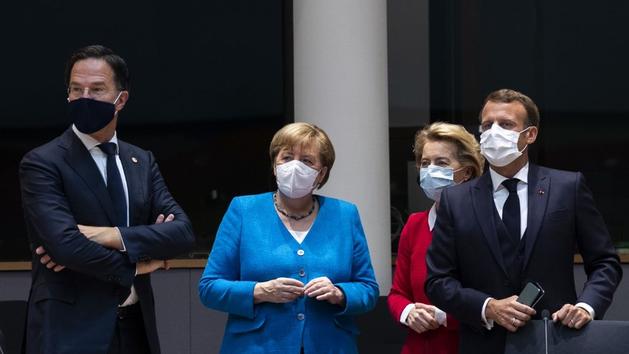Nicolas Goetzmann is responsible for research and macroeconomic strategy at Financière de la Cité.
FIGAROVOX.- The dissensions which were violently expressed Sunday evening at the time of the European summit, opposing in particular France and Germany to the “frugal” countries of Northern Europe, were they foreseeable?
Nicolas GOETZMANN.- The date of this summit has been known for several weeks and each other's positions have been on the table for nearly two months. The difficulty in reaching an agreement over the past four days reveals an obvious lack of preparation, although negotiations have obviously taken place upstream. However, this lack of preparation collided with a desire to obtain a quick agreement, in particular on the side of Emmanuel Macron, which led to many concessions on the part of a camp which nevertheless had a very large majority. This impatience benefits - for the moment - the frugal countries which impose their tempo on the majority. It should be noted that Angela Merkel does not seem to have become too involved in this path of haste. On the morning of the 19th, Angela Merkel indicated that it was possible not to find an agreement"It is also possible that no result will be obtained today" , while Emmanuel Macron preferred to give a more positive horizon by indicating: "We are ready to compromise without giving up ambition" , which reinforced the hand of the "frugal".
Emmanuel Macron seems to have taken the lead in negotiations with forced march, which leads to the gradual sinking of the initial ambitions of the European recovery plan.The unraveling of the initial plan continued to such an extent that Christine Lagarde deemed it necessary to intervene on the evening of the 19th through an interview given to Reuters. The President of the ECB said: “From my point of view, it would be better to agree on an ambitious plan (ie corresponding to the Commission's initial plan) even if it takes longer. I hope that the leaders will agree on something ambitious rather than rapid. ” But apparently the message did not get through, and Emmanuel Macron seems to have taken the lead in the negotiation with forced march, which leads to the progressive sinking of the initial ambitions of the European recovery plan.
Do you understand the reluctance of the "stingy" (to use the headline of "Liberation" this Monday morning)?
There are two ways of looking at it. The first is to consider that the “frugal” manage their public finances well and that they do not want to pay for spending and “irresponsible” countries. It is an essentially moral vision which is used politically by these countries with their constituents. This would be in line with the exit of Jeroen Dijsselbloem (former Dutch boss of the Eurogroup) in 2017, who had indicated: “as a social democrat, I attach exceptional importance to solidarity. But there are also obligations. You can't spend it all on alcohol and women before asking for help ”. Yet even if it may seem counterintuitive, Italy has been more rigorous than the Netherlands in keeping its budget over the past 20 years, so this argument does not hold water. These leaders of frugal countries only seek to flatter the preconceptions of their voters.
European budgetary solidarity is excluded from the Treaty by article 125.The second approach is to consider that this European plan bypasses the spirit of the Treaties. This is a reality. European budgetary solidarity is excluded from the Treaty on the Functioning of the European Union by Article 125 which can be summed up by a phrase : "a Member State is not responsible for the commitments of another Member State" . However, if the mechanism envisaged makes it possible to avoid this pitfall as best as possible, it is indeed the spirit of the Treaty that is violated. Under these conditions, the only way to put together a recovery plan that looks like a real recovery plan would be a revision of the Treaties. We may regret it, but this argument is relevant; what is being done today does not correspond to what has been signed by the States.
Would it have been preferable to avoid staging such tough negotiations, by opting for stimulus solutions orchestrated at national level and supported by European monetary policy?
On March 18, the European Central Bank implemented a plan specifically dedicated to the Covid-19 crisis. This plan provided for the buyout of debts from the euro zone for an amount of 750 billion euros, which was increased a few weeks later for a total of 1,500 billion euros. This plan allows governments to go into debt directly while having the assurance that the ECB will buy back a large part of the debt issued. It was this plan that made it possible to see the situation on the financial markets stabilize. A revival at the state level could have been very rapid, targeted and effective.
The absolute desire to use the Covid-19 crisis to rush into a federalist logic was counterproductive.But Europeans preferred to take it to the next level by trying to find a common solution. Unsurprisingly, this choice led to slowness, and to an ambition for quite relative economic efficiency. The absolute will to use the Covid-19 crisis to rush into a federalist logic was completely counterproductive in the field of economic efficiency. Congress in the United States took two weeks to agree on a $ 2,900 billion plan, which became law on March 27. Europe takes several months for a multi-year plan of less than 400 billion euros with many conditionalities.
What is Emmanuel Macron looking for when he wants to win his showdown on the European recovery plan at all costs?
A federalist primer. Even if this recovery plan does not correspond to a logic of eurobonds, since it is the European Commission which borrows and each State is responsible only up to its participation in the budget of the commission, it constitutes a precedent for a European federalist ambition. The question is whether this ambition corresponds to the need of the moment and the will of the voters.
In the end, in this crisis, is Europe more the problem or the solution?
Despite its initial slowness, the ECB has so far fulfilled its role. Its action is still far from optimal but what has been done is light years away from what had been done in 2008. From this point of view, Europe has no longer been a solution. But from the point of view of the European Council, this is much more mixed, because the priorities seem to have been much more political than economic.
Read also: EU recovery plan: Emmanuel Macron hails "progress" despite "very tense moments"
But this negotiation will have made it possible to show the public the reality of the content of the recovery plan. From the start, the amount announced is 750 billion euros, but we realize that the states only negotiate for an amount close to 400 billion. The differential consists only of loans which ultimately serve only to artificially inflate the amount to the public. The "real money", to use Emmanuel Macron's words, is 400 billion, or 2.6 points of EU GDP.













/cloudfront-eu-central-1.images.arcpublishing.com/prisa/KMEYMJKESBAZBE4MRBAM4TGHIQ.jpg)

